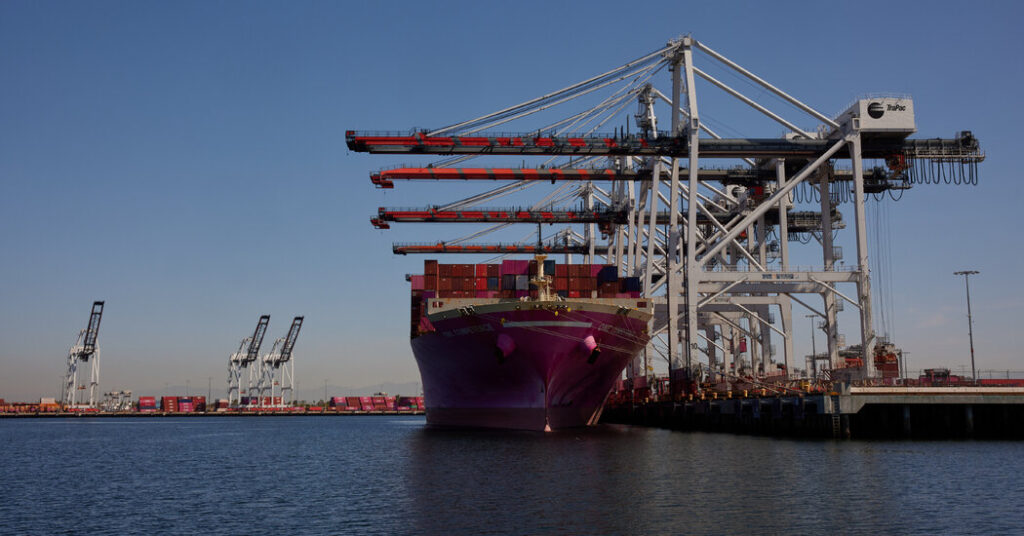President Trump’s trade war is anticipated to slow down economic growth worldwide this year, primarily due to his aggressive tariff policies impacting the United States, the largest economy globally.
The International Monetary Fund released new economic projections on Tuesday, following Mr. Trump’s decision to raise tariffs to heights unseen since the Great Depression.
The president has introduced a 10 percent tariff on nearly all imports, along with severe tariffs of at least 145 percent on Chinese goods entering the U.S. He also enacted “reciprocal” tariffs on major trading partners like the European Union, Japan, South Korea, and Taiwan, but has delayed these until July to pursue bilateral trade agreements.
Mr. Trump’s strategy has instilled crippling uncertainty among U.S. companies that export goods or depend on international components, leading to decreased output as global economies were starting to stabilize after years of high inflation. China and Canada have retaliated with their own trade barriers, and the European Union is ready to impose additional tariffs if the U.S. moves forward with its planned 20 percent tax.
The World Economic Outlook report indicates that global economic growth is set to drop to 2.8 percent this year, down from 3.3 percent in 2024. Earlier in January, the fund had predicted stable growth for 2025.
The I.M.F. now anticipates slower output next year than it originally forecasted.
A significant portion of this year’s downgrade is linked to the effects of tariffs on the U.S. economy, which was already expected to lose its momentum this year. The I.M.F. predicts U.S. growth will decline to 1.8 percent in 2025, a drop from 2.8 percent last year. This new forecast is almost a full percentage point slower than the 2.7 percent growth the I.M.F. expected for the U.S. back in January, when it was the world’s strongest economy.
“The global economic system that has functioned for the last 80 years is undergoing a reset,” said Pierre-Olivier Gourinchas, the I.M.F.’s chief economist, during a briefing this week. “The U.S. tariff rates have exceeded levels recorded at the beginning of the 20th century. Beyond the tariffs themselves, the rising uncertainty regarding policies—especially trade—plays a significant role in shaping the economic outlook.”
The I.M.F. forecasts also highlight that tariffs could complicate efforts to manage inflation. The fund has raised its inflation prediction for the U.S. to 3 percent, up from 2 percent this year.
Mr. Gourinchas noted on Tuesday that while the increase in price pressures from tariffs may be temporary, the decline in productivity and output is likely to be long-lasting. Although the I.M.F. is not predicting a recession in the United States, the likelihood of such an event has climbed to 40 percent, up from 25 percent in October.
Forecasts for growth in China and Europe have also been reduced, but the I.M.F. suggested that government fiscal support could help mitigate the impact of the tariffs.
The I.M.F. pointed out that its forecasts are subject to various unpredictable factors. The Trump administration has already postponed some tariffs it had implemented and is actively negotiating trade agreements with multiple countries in an effort to reduce the reciprocal tariffs initiated on April 2.
However, the largest economies, particularly the United States and China, seem to be caught in a long economic standoff that may hinder global economic performance until a resolution is found.
Mr. Trump has indicated he is willing to modify his tariffs if market volatility increases, as witnessed earlier this month. However, there has been no indication that he plans to change course significantly.
“We must restore the Wealth of our Great Country, achieving true RECIPROCITY,” Mr. Trump posted on his social media platform, Truth Social, over the weekend. “But for those seeking the simplest route: Come to America and produce in America!”
Recently, Mr. Trump has escalated his public attacks on Jerome H. Powell, the chair of the Federal Reserve, accusing him of engaging in “political maneuvering” and being too slow in reducing interest rates.
When asked whether Mr. Trump might attempt to remove Mr. Powell before his term concludes next year, Mr. Gourinchas argued that it’s crucial for markets to trust that central banks will act to manage inflation effectively.
“Central banks must maintain credibility, and a major part of that is ensuring their independence,” he stated. “It’s vital to uphold that.”
The I.M.F. has been warning for years that the fragmentation of the global economy and escalating trade disputes could threaten productivity and overall global growth. Mr. Gourinchas mentioned in the report that the potential for countries to raise tariffs even further poses a significant risk to the global growth outlook, especially for developing nations.
“The global economy has shown remarkable resilience in the face of the intense shocks over the last four years but still retains significant scars,” Mr. Gourinchas noted. “It is now facing another severe test, particularly for emerging markets and developing nations, which have fewer buffers.”


